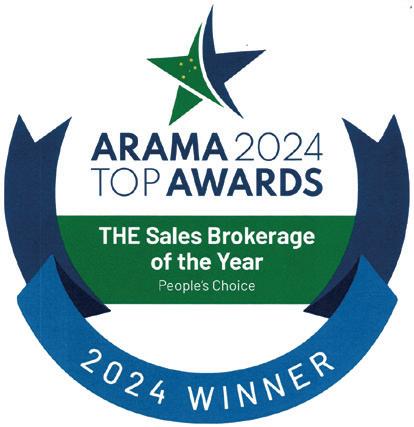





















































































The views and images expressed in Resort News do not necessarily refl ect the views of the publisher. The information contained in Resort News is intended to act as a guide only, the publisher, authors and editors expressly disclaim all liability for the results of action taken or not taken on the basis of information contained herein. We recommend professional advice is sought before making important business decisions.
The publisher reserves the right to refuse to publish or to republish without any explanation for such action. The publisher, it’s employees and agents will endeavour to place and reproduce advertisements as requested but takes no responsibility for omission, delay, error in transmission, production defi ciency, alteration of misplacement. The advertiser must notify the publisher of any errors as soon as they appear, otherwise the publisher accepts no responsibility for republishing such advertisements. If advertising copy does not arrive by the copy deadline the publisher reserves the right to repeat existing material.
Any mention of a product, service or supplier in editorial is not indicative of any endorsement by the author, editor or publisher. Although the publisher, editor and authors do all they can to ensure accuracy in all editorial content, readers are advised to fact check for themselves, any opinion or statement made by a reporter, editor, columnist, contributor, interviewee, supplier or any other entity involved before making judgements or decisions based on the materials contained herein.
Resort News, its publisher, editor and sta , is not responsible for and does not accept liability for any damages, defamation or other consequences (including but not limited to revenue and/ or profi t loss) claimed to have occurred as the result of anything contained within this publication, to the extent permi ed by law.
Advertisers and Advertising Agents warrant to the publisher that any advertising material placed is in no way an infringement of any copyright or other right and does not breach confi dence, is not defamatory, libellous or unlawful, does not slander title, does not contain anything obscene or indecent and does not infringe the Consumer Guarantees Act or other laws, regulations or statutes. Moreover, advertisers or advertising agents agree to indemnify the publisher and its’ agents against any claims, demands, proceedings, damages, costs including legal costs or other costs or expenses properly incurred, penalties, judgements, occasioned to the publisher in consequence of any breach of the above warranties. It is an infringement of copyright to reproduce in any way all or part of this publication without the wri en consent of the publisher. © 2025 Multimedia
Welcome to the February 2025 edition of Resort News!
As we dive into the new year, it’s natural to focus on goals, responsibilities, and successes. But I want to take a moment to highlight something just as important— taking care of yourself.
Running a business in this industry often means long hours, tight deadlines, and the pressure to always be available. Many of you know firsthand how easy it is to fall into the habit of working seven days a week, pushing through exhaustion, and telling yourself that rest can wait. But the reality is, burnout doesn’t wait. Your mental health and well-being are just as crucial as your bottom line.




Mandy Clarke, Editor editor@accomnews.com.au
Recent conversations in our community reinforce this message. We’ve heard from managers who have found balance, reconnected with their families, and rediscovered their passion for the industry simply



by prioritising their well-being. Seeking support—whether from peers, professional networks, or mental health professionals— isn’t a weakness. It’s a strength. If you’re feeling overwhelmed, reach out. You are not alone.
In this issue, we continue to bring you valuable insights and inspiring stories from across the industry. Marion Simon shares a powerful perspective on the physical, mental, emotional, and spiritual challenges of this profession. This theme of balance is echoed in our profiles of inspiring industry leaders. Lel Parnis exemplifies dedication and resilience, leading her team at Holmans while balancing the demands of raising a young family. Meanwhile, Craig Dunne, manager of the permanent residence building Peninsula Apartments, shares his journey
of stepping away from the fast-paced world of shortstay property management to put his young family first.
As we move further into 2025, I encourage you to take a step back—not just to assess your business goals, but to check in on your own wellbeing. Success isn’t just about how hard you work; it’s also about how well you take care of yourself along the way.
Here’s to a year filled with balance, well-being, and happiness. A quote that resonates deeply with me is: “Be kind. Everyone you meet is fighting a hard batt le.” — Ian MacLaren (John Watson), Scott ish author.
Warm regards, Mandy




Experts in management rights sales
Australia’s foremost management rights sales agency, with 15 years of expertise and a dynamic team of over 15 agents strategically positioned along the vibrant expanse of the east coast, we bring unparalleled expertise and dedication to every client interaction. mrsales.com.au | 1300 928 556 Experts in accommodation sales
National coverage and expertise in the sale of motels, hotels, caravan parks, pubs & MHEs tourismbrokers.com.au | 1300 512 566 Working together, working for you Keep reading for more listings...








By Trevor Rawnsley, CEO, ARAMA
One of the costliest blunders management rights operators can make is leaving it to others to run their business. It happens more often than you might think. In fact, I was absolutely flabbergasted when I attended a recent industry function and heard the story of a manager who discovered he had been underpaid by $67,000.
His agreement stipulated a remuneration increase every year in line with the CPI— consumer price index—but this manager hadn’t checked to ensure the increases were being made for five whole years.
He wanted to blame everyone but himself for the mess, saying it was the body corporate manager’s job to adjust his payments. To me, it was a glaring example of someone not running their business but letting their business run them.
That misfiring manager will now have to approach the body corporate and ask for reimbursement of the money— accumulated in one big lump sum from five years of neglect. He might succeed and get the back pay, but doing that certainly won’t make him very popular in the workplace.
If he doesn’t have a good relationship with the body corporate and they refuse to
It’s crucial to mind your business, ensure it flourishes, and verify you’re receiving fair remuneration
cooperate, he may need to ‘lawyer up' and take action through the courts—but at what cost? Apart from the legal fees and court costs, there’s the risk of further straining the relationship with the body corporate.
I get that we’re all busy, and yes, it would be nice to rely on others to be efficient and do the jobs they’re paid to do. However, when it comes to the little things required to run your business, you shouldn’t leave it to someone else to ensure they happen as they should and when they should. Little things can add up to big things, and in this case, big dollars have been missed due to poor business controls.
You can do the maths: in the event of a sale, the impact of the multiplier and the additional financial loss could be significant.
Surely a better way for him to manage his business would have been to contact the body corporate manager each year
at CPI time, ask what they considered the CPI to be, and then verify with his accountant that the remuneration was updated correctly.
What might have started as a small CPI adjustment— especially during the COVID years—can compound into a very significant loss.
In any business, attention to detail often determines success or failure. And what more important detail could there be for a business owner than ensuring they are being paid what their agreement states?
Yet, I’m staggered when I hear of managers putting their businesses up for sale and telling the valuer or broker they’re “not sure” about their exact remuneration when it’s time to include it in the sales document.
How much a manager is paid is decided collectively between the body corporate and the residential manager

via an agreement. The terms are put in writing, with rules and remuneration amounts clearly stipulated. It is the body corporate manager’s job to pay the invoices accurately, but it is the residential manager’s job to ensure they are being paid what the agreement specifies and to check each year that their pay has been adjusted in line with the contract.
The more I delve into this topic, the more amazed I am that some business owners leave such vital aspects of business success to others. Caretaking remuneration is just one example. Over the next two articles, I’ll explore the role of ARAMA members as caretaking service providers, onsite letting agents, and business owners.
As a caretaking service provider, you must be diligent about all the tasks required for the scheme—but you also need to ensure your own business is in order to do that effectively.
Christmas may have come and gone, but managers should still be “making lists and checking them twice” to avoid ending up like the manager in the naughty list who now has to go cap in hand to the body corporate chasing five years of back pay.
When it comes to building maintenance and general cleaning tasks, having a good checklist is essential. Checklists are crucial for management rights operators to succeed. Software packages like MYBOS can help you track and manage tasks, while also providing detailed reports that can be presented to the body corporate as proof of the work you do on their behalf.
This kind of documentation is critical when requesting top-ups or other variations to your agreement.
A management rights agreement typically includes a contract that outlines how much you should be paid for your role. It may also stipulate specific CPI increases or general annual increases, such as 5 percent.
As we’ve seen, some residential managers fail to check whether they’re receiving these pay adjustments accurately and on time. The body corporate
manager is responsible for paying invoices for the scheme, but they may not be paying the manager the correct amount if they’re working off an outdated agreement.
It’s up to you as the manager to ensure you are being paid the correct amount.
If you are in a salaried position and your wage increases every year under your contract, any logical person would check their pay to ensure they’re receiving the contracted increase.
For a residential manager to turn around and say, “It’s not my job to check my pay,” is simply unbelievable. If they’re not checking their pay, what else are they neglecting?
That’s why residential managers need to be thorough in itemising and ticking off the essential requirements of their role.
Every contract is different, but some caretaking remuneration agreements include clauses stipulating that remuneration will be adjusted by CPI or five percent, whichever is higher.
You should be checking to ensure your pay is in line with the contract and updated according to its terms.
The consequences of not doing so go beyond underpayment. Regular remuneration increases can significantly enhance your business’s value due to the multiplier applied at the time of sale.
If you’ve underpaid yourself by $67,000, that could lead to a substantial drop in your business’s value.
Similarly, it’s essential for residential managers to diarise dates for exercising options in their agreements.
You should seek independent legal advice, but many agreements include clauses stating that every five years, the manager is entitled to an automatic top-up or term extension.
However, the residential manager often needs to formally notify the body corporate of their intention to exercise this option. Sadly, managers forgetting to exercise their option by the due date is still quite common.
Some members call me saying they forgot, with excuses like, “I thought the lawyer was going to remind me,” or, “it’s the body corporate manager’s job.”
I asked one of them: “How long have you got left on the agreement?” they said, “12 months.”
“12 months!?” I replied, stunned. “You’ve let the agreement run down to 12 months?”
“Well,” they responded, “I thought it would automatically top up, but now I realise it hasn’t.”
Then they asked sheepishly, “How serious is that?” “Well,” I explained. “On a scale of one to 10, it’s a 12!”
In these cases, the manager must go back to the body corporate, to request a new agreement or an extension. But without a clause permitting a five-year extension, they could be out of options.
Managers must also ensure they request top-ups from the body corporate. Applying for a top-up is adding term to an
existing agreement, but in many cases, if you don’t ask for it you won’t get it. Often when there are extensions to be exercised, the only way you can get an extension is by advising the body corporate that you want them.
Letting your agreement run down without topping up can reduce your business’s value and appeal to buyers.
In my next column, I’ll cover some of the most important tasks you need to perform as a caretaking service provider, onsite letting agent, and business owner.
Remember, it’s crucial to mind your business, ensure it flourishes, and verify you’re receiving fair remuneration and every provision in your contract. This isn’t just vital for your business—it ensures the industry remains strong, and relationships between managers and body corporates remain fair and equitable. That means good business on anyone’s list.












By Ben Ashworth, Senior Associate, Small Myers Hughes Lawyers
The major decisions that are made by a body corporate are decided by a vote of the owners at a general meeting. Some decisions require a simple majority, while more contentious matters might require a unanimous resolution of all owners attending the meeting. No matter how vocal an opposition is to a motion being proposed, there is always a chance that a vote can be won in the right circumstances. It is impossible to win a vote, however, if the motion never even makes it onto the agenda.
Winning a vote to extend the term of your caretaking agreement can be essential to maintaining the value of your business and satisfying the requirements of your financier. A variety of strategies can be taken to give yourself the best chance of succeeding. Before you can implement those strategies though, you need to ensure there is a meeting being held that meets the requirements for your motion and that your motion is actually on the meeting agenda.
If you own a lot in a strata scheme you hold a right to include motions on the agenda of body corporate meetings and a right to request that the body corporate call meetings. To ensure that all
Winning a vote to extend the term of your caretaking agreement can be essential to maintaining the value of your business
owners have reasonable time to consider a motion being proposed, motions must be submitted to the body corporate well in advance of the date the meeting is being held. Motions cannot be sprung on owners without notice, for instance, you cannot raise an issue at a meeting and ask owners to make a major decision then and there.
Depending on which state or territory your strata scheme is located in, to include a motion on the agenda of the annual general meeting (AGM) for the body corporate you will need to submit your motion around one to three months before the meeting is due to be held. If you are unsure of when your cut-off date falls you should speak to your strata manager. In some circumstances you might still be able to get your motions on the agenda after the cut-off date, but this relies on you having a very good relationship with the committee and the agenda for the meeting not being finalised already.
If you can’t wait for the next AGM to roll around and you need your motions voted on sooner, you will need to request that the body corporate hold an extraordinary/
special general meeting (EGM). As a lot owner, you can request the body corporate hold an EGM at any time. The body corporate is not however required to hold an EGM simply because you ask. The committee can elect to hold an EGM when requested, but if the committee doesn’t agree that the matter is urgent the committee can elect to hold onto your motions until the next general meeting is called in the usual course of events.
The committee can be forced to call an EGM in specific circumstances, which vary from state to state. Generally, you will need to collect a written request from at least 25 percent of the owners in the strata scheme to force the calling of an EGM. Even if you do have the support of a majority of owners to call an EGM, note that there will still be a delay (usually at least one or two months) between requesting the meeting and the meeting being held. Therefore, if you need an EGM to be called for your motions you should be starting the process at least three months before you need it, if not more.
If you do not own a lot in the strata scheme, you likely have no
rights to submit a motion or call a meeting of the body corporate. This means that you will need to maintain a very good relationship with the committee if you want to rely on the committee allowing you to include motions on the agenda or calling meetings when you need them. This is fine for most day-to-day matters, but is risky when wanting to raise things that are contentious with the body corporate or with certain owners on the committee.
To avoid this risk you need to foster a strong relationship with individual owners in the body corporate, such as owners in your letting pool. When you don’t own a lot in the strata scheme it is essential that you have one or more owners that you can rely on to submit motions and requests to the body corporate on your behalf. If you can’t get your motion on the agenda it doesn’t matter how many owners are in your corner, as they will never get a chance to vote on your motions.
Liability limited by a scheme approved under Professional Standards Legislation.
Disclaimer – This article is provided for information purposes only and should not be regarded as legal advice.
Prompt payment of body corporate levies is not just about keeping a neat and up-to-date set of books.
It ensures common property is well maintained and funds are readily available to pay contractors and insurance.
It provides all owners with the peace of mind that works can be funded and promptly completed without the need to further dip into their pockets to top up the funds.
This article covers the importance of paying levies and what could happen if lot owners do not pay.
It also provides information about the potential disputes that could be resolved through our office in relation to body corporate levies.
We are often asked, “is that a body corporate responsibility?” when speaking with clients about who should foot a bill.
That’s because there can be a misunderstanding regarding what the body corporate is and how it functions. While some would like to believe the body corporate is some mythical entity with a bottomless sinking fund, it’s not.
It is a conglomerate of all lot owners who are all responsible for contributing their share toward common expenses, such as the maintenance of common property and insurance.
That’s why it is imperative that all owners pay their levies on time to ensure the body corporate has the funds when they are needed.

The importance of paying levies and what could happen if lot owners do not pay.
The body corporate must prepare a budget each financial year to cover expenses that might reasonably be expected to occur and maintain administrative and sinking funds.
The administrative fund is used for day-to-day recurrent expenses, such as gardening services.
The sinking fund is used for expenses of a capital or nonrecurrent nature, such as painting buildings or resurfacing the common property driveway.
As part of managing and planning for these funds, the body corporate should obtain a forecast.
This is a plan that projects the current financial year, and the next nine financial years, expenses the body corporate is likely to incur. This assists the body corporate
in preparing budgets and setting appropriate levies to meet anticipated expenditure, without having to raise additional funds through a special levy.
A special levy is required if the body corporate has inadequate funds to cover a particular expense. It should only be used as a back-up plan and not be repeatedly relied upon.
In some situations, where there is a shortfall of funds, the body corporate could consider going back to a general meeting to adjust the budget.
This would allow more money to be allocated towards specific expenses to cover a shortage, but this is not a long-term fix for inadequate budgets.
When some owners don’t pay levies, the body corporate may have to raise a higher special
levy so that the owners who do pay cover those who don’t.
This can create unnecessary tension due to inequity among owners.
Sometimes special levies are still required even if a body corporate collects levies and maintains a good budget.
For further information around special contributions, refer to our webpage, “Owner's contributions”.
Even though there is a rising cost of living crisis it would be derelict of a body corporate to reduce levies to provide financial relief for owners.
While reducing levies may be a feel-good thing to do, budgets must be managed effectively.
There could be long-term financial consequences for a body corporate if it reduces levies purely to assist owners.
A reduction in funds could delay important decisions being made.
If the body corporate needs to make a large expenditure and there is either no provision or inadequate provision in the budget, a special levy may be required and a general meeting called.

Calling a general meeting will add further expense to a body corporate which will be passed on to owners through their levies.
Therefore, while reducing levies may provide short-term relief for owners, bodies corporate need to focus on the bigger picture and maintain a long-term view about ongoing maintenance and having sufficient funds for emergency expenses.
A well-managed budget with a healthy sinking fund can help avoid the need for special contributions, minimising financial surprises for owners.
The body corporate must provide lot owners at least 30 days' notice in writing when seeking a contribution for a levy, special levy or instalment for a levy.
The notice must be in writing and contain specific information as outlined in section 163 of the Standard Module.
An owner must inform the body corporate about how they would like to receive the notice.
If an owner has not advised the body corporate on the method they wish to receive correspondence, it must be sent to the physical address recorded on the body corporate roll.
If an email address has been supplied to the body corporate, the lot owner is taken to have consented to receiving notices via email (section 216 of the Standard Module).
The lot owner is responsible for providing the correct address to the body corporate.
If a lot owner has to update the body corporate roll to change or amend their address for service, legislation states that notice must be sent to the body corporate—NOT the
body corporate manager.
Once a lot owner has provided details to the body corporate, the body corporate has 14 days to update the address for service in the roll (section 225 of the Standard Module).
If an owner has difficulty paying levies, due to circumstances beyond their control, they should speak to their committee and let them know.
Some owners decide to withhold levies purposefully to force the body corporate to follow through on motions.
For example, if you believe the body corporate is required to undertake a specific maintenance task, withholding levies is an unlawful way to force the body corporate to act.
This can result in the lot owing a body corporate debt and losing the ability to vote on general meeting motions or be a member of the committee.
The body corporate can impose a penalty on overdue levies at a general meeting by passing a motion by ordinary resolution.
The penalty must be calculated using a simple interest rate of not more than 2.5 percent for each month a contribution, or portion of a contribution, is due.
If a lot owner makes a payment towards an overdue contribution, they should be aware that there is an order to the way the payment is applied to the outstanding debt.
The order in which payment for overdue contributions are applied is as follows:
• firstly, towards the penalty;
• secondly, in reduction
of the outstanding contribution or instalment;
• thirdly, towards any recovery costs for the debt.
The body corporate can also apply a discount for early contributions by passing a motion by ordinary resolution at a general meeting (section 164 of the Standard Module).
The discount cannot be more than 20 percent of the amount to be paid.
This allows a lot owner to benefit from being proactive in paying contributions on time and avoid unnecessary stress.
At the body corporate level, this incentive to pay levies on time ensures that money is available when needed and the body corporate can function smoothly.
If a contribution is not paid to the body corporate on time, it could prompt the body corporate to start a debt recovery process against the lot owner.
The legislation provides that a body corporate must start a debt recovery process after two years of debt being outstanding. However, there is nothing preventing the body corporate from deciding to start that process earlier (section 166 of the Standard Module).
This means if a levy is not paid, not only can the body corporate recover the contribution or portion of the contribution, if not received by the due date, but additionally a penalty for late payment.
Reasonable recovery costs can also be recovered from a lot owner who owes a body corporate debt.
An important and defining aspect of being a lot owner is the ability to vote.
If at the time of a general meeting, a lot owner has an outstanding contribution, they lose the ability to vote for that lot.
This means a lot that has an outstanding contribution
cannot participate in important decisions the body corporate is voting on.
This could include decisions around further expenditure required of the body corporate. However, there is an exception.
An owner who has an outstanding debt can vote, when deciding a motion that requires resolution without dissent (section 102 of the Standard Module).
When an owner owes a debt at the time committee nominations are being called, they are unable to nominate or be nominated, for the committee. If they remain in debt at the time of the body corporate committee election, they are also unable to be elected.
Committee members who owe a body corporate debt after they become a committee member are unable to vote. This may have a negative impact on owners if there are not enough committee members to form a quorum.
While our office provides dispute resolution services to people working and living in bodies corporate, the office is limited in what debt disputes can be considered.
An adjudicator does not have jurisdiction to determine a debt dispute. However, some matters can be conciliated if proceedings have not already commenced in another court or tribunal.
Practice Direction 24 –Debt disputes, provides more information about disputes of this nature.
Disputes about money owed can arise from a lack of communication, which may result in the need to have the issue resolved through our office.
Disputes about the payments of levies through our office could stem from an error in the notice given, due dates for payments, amounts required to be paid, or even from something as simple as an incorrect or outdated address for service.
If there are special circumstances as to why you can’t pay your levies you can ask the body corporate to waive penalties and debt recovery costs, and reinstate discounts.
The body corporate and committee are required to act reasonably, including making or not making a decision, and that includes your request for them to consider waiving these additional costs relating to your debt.
If a lot owner believes that a committee has acted unreasonably in deciding, refusing or ignoring their motion to waive penalties, or the liability for recovery costs, they may be able to dispute that decision through our office.
Having an outstanding debt does not prohibit an owner from submitt ing motions to either committee or general meetings in an attempt to resolve their dispute. The onus is on the applicant to demonstrate:
1. How they have attempted to resolve the dispute
before applying for dispute resolution (self-resolution).
2. How the body corporate has acted unreasonably; just voting no is not of itself an unreasonable decision.
The Reserve [2015] QBCCMCmr 353 (28 July 2015)
An application lodged in early 2015 was dismissed by an adjudicator, ruling that a committee decision to not reinstate a disallowed discount, and to reimburse the applicant, was not unreasonable.
The applicant was seeking a reimbursement of $509.89 which was the amount of a disallowed discount. Payment of the levy was due on December 5, 2013. The levy was paid on December 23, 2013. The applicant argued that the late nature of the payment of levies was due to an unexpected death in the family. The applicant requested twice in 2014 that the committee reinstate the disallowed discount, twice the committee voted no.
The evidence provided in the


application was not provided to the committee at the time of its decisions. Additionally, while the body corporate may choose to reinstate the discount for special reasons, the committee decided that given the circumstances and evidence provided, there were no special reasons. As such, it voted no on both occasions.
Our office resolves disputes through conciliation and adjudication.
We publish the outcome of all adjudications online through the
Australasian Legal Information Institute (Austlii) website.
Previous adjudicators orders are not precedents. Each order is made based on the evidence provided for in each application. However, referring to previous orders can be an eff ective way to see how the legislation has been interpreted and applied to previous situations.
Levies being paid on time benefi ts both owners and bodies corporate and ensures the day to day running of the body corporate goes smoothly.






















By Sarah Davison, Industry Reporter
When Lel Parnis graduated from university in Glasgow at just 20, she knew she wasn’t quite ready to enter the workforce while many of her peers were still studying.
“It was a fascinating chapter in my career,” she said. “I gained valuable experience in managing complex projects, streamlining operations, and fostering collaboration across diverse teams.”
Returning to Australia, Lel found herself drawn to the accommodation sector—a connection that was both personal and professional.

A fateful trip to Australia led to meeting her future husband and, eventually, a life in Queensland. life is defined by her passion for maintaining a healthy work-life balance— not just for herself but also for her team—

with her young family and has carved out a rewarding career as a senior accountant and team manager at Holmans. Lel’s professional
and by her commitment to helping clients,
particularly in the accommodation sector, build thriving businesses.
Lel’s career in accounting began in Australia, where she focused on tax, financial, and business compliance. But her professional path took her back to the UK when she and her husband moved to London for four years. There, Lel immersed herself in change management and global finance projects, working to develop systems and processes for finance departments.







“My husband’s parents had a management rights business on North Stradbroke Island years ago, and we used to help them out,” Lel explained. “That experience, combined with the opportunity to work at Holmans, drew me into the management
with
rights accommodation sector.”
Lel explains she has come to enjoy specialising in this industry because it allows her to go beyond just financials and tax returns, which she adds can get a bit dry after a while.
on operational aspects of our clients’
“We’re able to provide more tailored advice businesses, like managing issues with unit owners or handling body corporate matters.”
In fact, Lel says specialising in the
industry has led her to become a trusted
voice and a sounding board for clients, who rely on her deep understanding of the sector for guidance.


“For myself and my team, we try our best not to advise on insurance policies or provide legal advice by any stretch, but we want to stay informed enough to say, ‘I think you're missing something,’ or, ‘You need to talk to a lawyer about that,’ or, ‘You should revisit this because you don't have coverage for it.’

“Being able to be across all the diff erent needs of our clients keeps our work interesting, and we’re constantly looking to improve our own knowledge of the industry.”
Part of Lel’s forward-thinking approach involves embracing technology and innovation. At Holmans, she is actively involved in exploring new tools and systems to streamline operations and enhance client experiences.
“We’re constantly exploring innovations, whether it’s AI or new systems, to improve how we work,” Lel shares. “Our goal is to ensure compliance while also making processes as seamless as possible for clients.”
For Lel, one of the most rewarding aspects of her role is the collaborative nature of the accommodation industry—something she says diff ers from other sectors.
“You know, compared to other businesses, this industry is so diff erent,” she said.
“You don’t see many tilers or carpenters gett ing together regularly to learn from each other.
“In most industries, businesses deal with each other in purely transactional ways—buying and selling. But in this sector, multiple times a year, there are awards ceremonies, trade shows, or events where everyone gets in a room to share intel and connect.
“Because this industry is so niche, we’re constantly working with the same people— insurance brokers, agents, and even other accountants. Over time, we build really strong relationships, and I think that’s something you don’t see as much in other small business accounting fields.”
In fact, Lel says that instead of a sense of competition, there is a strong spirit of collaboration among local professionals.
“We regularly meet with other accountants and professionals to ensure we’re all aligned on best practices,” she explained.
“It’s not about competition; it’s about ensuring the best

The heart of Lel’s professional philosophy is a dedication to helping clients succeed.
outcomes for our clients and the sector as a whole.”
This ethos of collaboration extends to her work at Holmans, where Lel is committed to fostering a culture of continuous improvement. Her team focuses on asking big questions and challenging the status quo.
“We’re big advocates for asking why things are done a certain way,” she said.
“Whether it’s working with clients or within our own firm, we’re focused on simplifying processes and implementing changes that make life easier.
“It’s always a challenge to implement change management when people are set in their ways—doing things just because the vendor did it that way or because it’s how they’ve always done it. No one likes to admit they’ve been making things harder for themselves, but once they see the benefi ts, they’re usually prett y happy about it.
“I always tell people, ‘Throw your printers out!’ There’s no need for paper anymore. It’s
better quality of life. We get the best of them because they’re not wasting time commuting, putt ing on uniforms, or sitt ing in traffic for 45 minutes each way.
“Of course, there are parts of office life that are valuable— like grabbing coff ee or those impromptu chats when you overhear something interesting. But with technology today, we’re on instant chat, video calls, or the phone face-to-face all day. We’ve really minimised the loss of connection.
“I don’t know what the goal is with forcing people back to the office, but we haven’t seen any drop in productivity—if anything, it’s improved. I think companies might find that instead of gett ing more out of employees, they’ll just start seeing work hours counted from the moment people leave the house to when they return.”
A key benefi t of her flexible work schedule is the ability to prioritise time with loved ones. Outside of work hours, you’ll find Lel at the beach with her family—enjoying the best of the Queensland climate.
about using what’s available, like electronic signing features or automated tools, to save time and streamline processes.
“And it extends beyond tax and compliance. There are a number of tools to assist in running a business more efficiently.”
While Lel’s career is undoubtedly demanding, she is deeply committed to maintaining a healthy work-life balance—a value she encourages in her team and embodies in her personal life. With a young family, she understands the importance of sett ing boundaries and prioritising well-being and believes flexible working is key.
“There's a big push now for a return to the office—people want ‘bums on seats.’ But I think flexibility, particularly for women or anyone with young kids, is a huge benefi t,” she said.
“That said, it’s about achieving a better work-life balance for everyone. I have team members who don’t have or want children—they simply value a
“We spend a lot of time at the beach. Luckily, we can ride our bikes to the beach from our house. Though it is chaotic—three kids, bikes, trailers, surfb oards, skateboards, scooters, you name it. We load it all up, ride over, and just park ourselves there for the day, hanging out with friends and soaking it all in.”
At the heart of Lel’s professional philosophy is a dedication to helping clients succeed. By focusing on tailored solutions and innovative strategies, she has built strong, lasting relationships with her clients in the management rights and accommodation sector. Her ability to navigate the unique challenges of this industry has positioned her as a trusted advisor and leader in her field.
As Lel reflects on her journey— from Glasgow to Queensland, from tax compliance to management rights—she sees each step as part of a bigger picture. Her diverse experiences and unwavering commitment to excellence have shaped not just her career but also the lives of the people and businesses she supports.















By Lynda Kypriadakis,

As a facilities manager responsible for the upkeep of strata titled apartment buildings near the coast, particularly in rolling surf beach locations, my role involves constant vigilance and proactive care to ensure the buildings remain in excellent condition.
Coastal environments present a unique set of challenges due to the combination of saltwater, humidity, high winds, and the constant wear and tear from environmental factors. These elements can affect both the structure of the building and the comfort of its residents. Proper maintenance, understanding the nuances of coastal living, and addressing the long-term wear on building materials are critical to ensuring that these apartment buildings remain safe, functional, and aesthetically appealing.
In this article, I will outline key aspects of facilities management for coastal apartment buildings, covering maintenance schedules, specific challenges posed by proximity to the ocean, and best practices for ensuring that residents enjoy a safe and comfortable living environment.
The coastal environment presents a range of factors that can accelerate the deterioration of building materials and systems. These include:
1. Saltwater and corrosion: The presence of salt in the air, especially in areas with rolling surf, accelerates the corrosion of metals. This impacts everything from steel framing and structural elements to balconies, handrails, and HVAC systems. Over time, corrosion can weaken structural integrity, leading to costly repairs and safety concerns.
2. Moisture and humidity: Coastal areas experience higher humidity levels, which can lead to the growth of mould, mildew, and algae. These issues can impact not only the building’s aesthetic appeal but also residents' health. Additionally, the constant moisture can cause damage to exterior surfaces, such as timber, paint, and even masonry, leading to frequent touchups and restorations.
3. High winds and storms: Coastal areas, particularly those exposed to surf, are prone to strong winds and occasional storms. These forces can damage roofing materials, windows, and exterior cladding. They can also cause debris to accumulate around the property, which requires frequent cleaning and maintenance.
4. UV exposure: The intensity of ultra-violet radiation near the coast can degrade outdoor materials such as paint,
plastics, and wood finishes. Over time, UV exposure can lead to fading, cracking, and the breakdown of materials, necessitating regular recoating and refinishing.
5. Sand and salt deposits: Coastal properties often experience an accumulation of sand and salt deposits around the exterior, pathways, and surrounding grounds. While this might seem like a minor issue, if left unaddressed, sand can erode surfaces, and salt can stain and corrode fixtures.
Given the unique challenges posed by coastal living, a comprehensive and proactive approach to maintenance is essential. Regular inspections, timely repairs, and the use of durable, high-quality materials are key to maintaining the structural integrity and aesthetics of the apartment building.
Below are some of the strategies and best practices I employ as a facilities manager to ensure the long-term health of coastal properties. The ABMA Building Management Code© of Australia and New Zealand, also provides guidance around maintenance and care of common property for facilities managers.
Routine inspections are the cornerstone of effective facilities management, especially in coastal areas. A carefully designed preventative maintenance schedule is essential to monitor the building’s condition, identify potential issues early, and ensure that proactive measures are implemented.
• Corrosion checks: Regular inspections of metal structures, including framing, handrails, gates, and HVAC units, are critical. I ensure that any signs of rust or corrosion are addressed promptly by cleaning, treating, and repainting affected areas. For structures that are particularly vulnerable to saltwater, we opt for materials that are corrosion-resistant, such as stainless steel or specialised coatings.
• Mould and mildew prevention: High humidity levels are a constant concern in coastal regions. To prevent the growth of mould and mildew, I maintain proper ventilation in high-moisture areas such as common property ablutions, gym and recreation facilities, and basements. I also implement regular cleaning schedules for ducts, vents, and airconditioning units to ensure good air circulation and reduce moisture buildup. In areas where mould growth is more common, I coordinate and arrange the application of fit-for-purpose mouldresistant treatments and sealants to prevent growth.
• Storm readiness: Living near the coast means dealing with stormy weather. I ensure that the flood and storm management plan for the common property is updated annually, and all committee members are inducted. I ensure that the building’s roof is in top condition (via a specialist contractor maintenance inspection) which includes checking for any loose tiles/ roof sheets or worn-out sealants or dilapidated waterproof membrane that could result in leaks. I also schedule periodic cleaning of gutters, downpipes, and drainage systems to prevent blockages from sand and debris. Additionally, I ensure that low lying entry points are fitted with flood shutters, particularly in high-risk areas, to minimise damage during extreme weather.
Choosing the right materials for both the interior and exterior of
coastal buildings is essential for mitigating the long-term effects of the environment. I prioritise the use of high-performance materials that can withstand the harsh coastal conditions while minimising maintenance costs.
• Corrosion-resistant materials: For metal fixtures and components, I recommend that the body corporate use materials that are either corrosionresistant (such as stainless steel) or treated with coatings that protect them from saltwater exposure. This helps extend the life of exposed outdoor metal infrastructure, structural supports, and HVAC systems.
• UV-resistant finishes: Given the constant UV exposure, I recommend that the body corporate chooses paints, coatings, and finishes designed to resist fading and deterioration. These materials are more durable, requiring less frequent re-coating and ensuring that the building’s exterior remains visually appealing.
• Weather-resistant exterior cladding: For cladding and external wall features, I recommend that the body corporate select weatherresistant materials such as fibre cement sheeting or aluminium, which offer good resistance to the elements.
• Waterproofing and sealing: I ensure that all exterior surfaces, including balconies, decks, and façade, are properly sealed and watertight to prevent water ingress. This helps reduce the risk of moisturerelated damage, such as rot or structural weakness, and ensures that the building remains dry and comfortable for residents.
The exterior surroundings of coastal apartment buildings also require specialised care. Coastal winds, salt, and sand can cause significant wear on gardens, walkways, and outdoor amenities.
• Salt and sand management: I schedule regular cleaning of outdoor areas to remove salt and sand accumulation, particularly around walkways,
balconies, and parking lots. This prevents corrosion and damage to both the building and the landscape.
• Wind-resistant landscaping: To reduce the impact of coastal winds, I recommend that the body corporate choose wind-resistant plants and trees for the landscaping. These plants not only add beauty to the property but also help reduce wind erosion and protect the building from sandblasting effects.
• Coastal erosion prevention: In some coastal areas, soil erosion can be a concern. I work with landscaping experts to ensure that the surrounding grounds are stabilised using erosionresistant methods, such as planting native grasses and installing retaining walls.
As a facilities manager, sustainability is a key focus in ensuring that coastal apartment buildings remain environmentally responsible while also reducing operational costs. Implementing energy-efficient solutions, such as solar panels, energy and water-saving systems, reduces the environmental footprint of the property. These practices not only help with cost control but also improve the building's resilience to the unique conditions of the coastal environment.
Facilities management for apartment buildings in coastal areas requires a strategic, proactive approach that accounts for the unique challenges presented by saltwater, humidity, high winds, and UV exposure. Through regular inspections, the use of durable materials, and maintaining the building’s exterior and landscaping, I work closely with the committee for the body corporate to ensure that the property remains safe, comfortable, and aesthetically pleasing for all residents. By addressing coastal challenges head-on, facilities managers can add value to the body corporate, prolong the life of the building, prevent costly repairs, and provide residents with a secure living environment in the stunning coastal setting they have chosen.

By Matthew Manz, Partner, Mahoneys
I recently received a phone call from a distressed manager. His opening line went something like this:
“Hi, it’s such and such here, I, um, forgot to exercise my option. What do I do now”?
It is every manager’s worst nightmare. Well maybe not quite the worst but it’s pretty close and can lead to a significantly uncomfortable amount of stress, worry and sleepless nights.
So, what does it actually mean if you don’t exercise an option?
In short, it means that your caretaking and letting agreements have come, or are about to come, to an end. When the agreements come to an end a manager essentially has little more than a unit (usually with some exclusivity rights) and potentially a rent roll.
How can the problem be fixed?
In 99 percent of situations, the only thing that can be done to fix the problem is for the body corporate to enter into new agreements at a general meeting. As managers will appreciate this is not straightforward and is likely to involve a significant amount of negotiation and compromise.
Here are two scenarios:
1. The body corporate refuses to enter into the new agreements. If a body corporate votes against a motion for new agreements the manager has no recourse against the body corporate; and
2. the body corporate will only agree to enter into new agreements on unfavourable terms. The unfavourable terms could be things such as a reduced salary or a significantly reduced term.
As you can see the results of not exercising an option can potentially be dire. I have had a number of managers over the years in the above predicament. Fortunately, there has been only one instance where a body corporate has refused to enter into new agreements.
Bearing in mind the above, it is vitally important that managers put in place a reliable system to remind themselves to exercise their options. I suggest the following:
1. Managers review their agreements along with their legal due diligence report from the time of their purchase (and any other advice from their solicitor) to determine the following:
(a) the length of the current term, including the term expiry date and the length of any option periods; and
(b) the relevant dates by which each option must be exercised; and
2. diarise the relevant dates with enough notice so that managers can take the appropriate action. Don’t let it happen to you!












By
In 2022, to encourage the adoption of electric vehicles (EVs) and reduce carbon emissions, the ATO introduced an FBT exemption for certain electric cars. This exemption aims to make electric vehicles a more attractive and cost-effective option for businesses and their employees.
The key eligibility criteria are:
• The vehicle must be a zero or low emissions vehicle. This includes battery-electric vehicles (BEVs), hydrogen fuel cell electric vehicles (FCEVs), and plug-in hybrid electric vehicles (PHEVs).
• The vehicle must be purchased at a price below the luxury car tax (LCT) threshold for fuel-efficient vehicles at the time of purchase. As of 2021, this threshold is $77,565.
• The car must be first held and used on or after July 1, 2022, and the value of the car at the first retail sale (or any subsequent sale) must be below the luxury car tax threshold for fuel-efficient vehicles ($91,387 in FY 2025, indexed annually).
• The car is used by a current employee or their associates (such as family members).
*From April 1, 2025, plug-in hybrid electric vehicles will no longer be considered zero or low emissions vehicles under FBT law, except if:
• Use of the plug-in hybrid electric vehicle was exempt before April 1, 2025.
• You have a financially binding commitment providing private use on or after April 1, 2025.
With the rule changes starting April 1, 2025, you have limited time left to purchase a plugin hybrid if you're looking to take advantage of this FBT exemption for private use if buying in your business entity.
When an employer provides an eligible electric vehicle to an employee for their use, the benefi t of providing that vehicle is exempt from FBT. This means that the employer does not have to pay FBT on the private use portion of the vehicle, which can result in significant tax savings. FBT is levied at 47 percent of the deemed taxable value of the benefi t provided.
Suppose a small business employer provides an electric vehicle to an employee. The vehicle is used both for business and personal purposes. Under normal circumstances, the employer would need to calculate the FBT on the private use portion of the vehicle, which can be a substantial cost. However, with the FBT exemption on electric vehicles, the employer is relieved from this tax obligation, making the provision of the vehicle more cost-eff ective.
The exemption only applies
to current employees. For the FBT exemption to apply, the vehicle needs to be supplied by the employer to an employee (including under a salary sacrifice agreement).
If an employee leaves the company and the electric vehicle is no longer provided as part of their benefi ts package, the FBT exemption will no longer apply to that vehicle.
Partners of a partnership and sole traders are not employees and cannot access the exemption personally.
Home charging stations are not included in the exemption. The FBT exemption includes associated benefi ts such as registration, insurance, repairs or maintenance, but it does not include a charging station at the employee’s home. If the employer installs a home charging station at the employee’s home or pays for the cost, then this is a separate fringe benefi t.
FBT might not apply but you do the paperwork as if it did. While the FBT exemption on EVs applies to employers, the value of the fringe benefi t is still considered when working out the reportable fringe benefi ts of the employee. That is, the value of the benefi t is reported on the employee’s income statement. While you don’t pay income tax on reportable fringe benefi ts, it is used to determine your adjusted taxable income for a range of areas such as the Medicare levy surcharge, private health
insurance rebate, employee share scheme reduction, and certain social security payments.
What about the cost of electricity? The ATO’s short-cut method can potentially be applied to calculate reportable fringe benefi t amounts and applies a rate of 4.20 cents per kilometre. If you are not using the shortcut method, you need to have a viable method of isolating and calculating the electricity consumption of the car.
The exemption does not apply if the employee directly purchases or leases the EV. If an employee purchases or leases the EV directly, and the employer reimburses them under a salary sacrifice arrangement, the FBT exemption does not apply because this is not a car fringe benefi t. However, the exemption can potentially apply to novated lease arrangements if they are structured carefully.
Not all electric vehicles are cars. To qualify for the exemption, the EV needs to be a car –electric bikes and scooters do not count, nor do vehicles designed to carry a load of one tonne or more or that carry nine passengers or more.
As always, consult with your accountant prior to making any significant business purchases or entering into new employee benefi t arrangements to ensure structured tax eff ectively from the beginning.

















































































































By Andrew Morgan, Motel Broker/Partner, Qld Tourism & Hospitality Brokers
Last issue, we kicked off 2025 with the first of a three-part “Selling” series of articles. The first article, “Selling: Enquiry through to inspection”, briefly discussed the initial stages of the selling process, from engaging with a prospective buyer to completing the physical site inspection.
In this issue, we move on to the negotiation stage, leading to the contract phase of the process. At this point, the prospective buyer is interested in purchasing the business based on what they’ve seen so far. The simplest way
for a buyer and seller to begin negotiations is for the buyer to make an offer in writing, typically using an “Offer & Acceptance (O&A)” form or similar document. The O&A serves multiple purposes, enabling both parties to clearly outline their terms and work toward an agreement quickly and at minimal cost.
Alternatively, a more formal offer can be made via a “Contract of Sale”. However, this method is more time-consuming and costly to prepare. If no agreement is reached, significant time and money may be wasted. A contract might be used at this early stage if the parties have already had discussions, reached a verbal agreement, and both parties are comfortable to proceed directly to a formal contract.
The negotiation process can be swift or lengthy, depending on various circumstances, such as how serious the buyer is about purchasing the business. A “low-ball” offer might suggest a less committed buyer, while an offer closer to the asking price typically signals genuine interest. The asking price itself can also reflect how committed
the seller is to selling. Other factors influencing negotiations include the offer’s terms, such as conditions to be met, time frames, settlement periods, and other contractual details.
Negotiations often involve back-and-forth exchanges as both parties attempt to meet on terms. For example, if a business sells for an oddly specific price, such as $1,000,129, it’s likely the result of a protracted negotiation with a lot of moving parts. Obscure purchase prices are more common in highly emotive transactions. In contrast, business sales are typically less emotional, as they are purely transactional.
The terms and conditions of an offer and contract play a role in determining the final agreed price. Buyers may sometimes make casual remarks or submit offers to "sound out" the seller’s "bottom line". Sellers should avoid engaging in this tactic, as it can put them in a weaker position, allowing buyers to dictate terms. Sellers should never consider an offer unless all terms and conditions are fully understood upfront.
Once an agreement “in principle”
has been reached—whether via O&A or verbally—the next step is to prepare the contract of sale. Most sellers will want their solicitor to draft and review these documents before presenting them to the buyer. Preparing the contract requires detailed information from the seller, their solicitor, accountant, and possibly a financial planner. This includes the O&A document, which outlines the terms of the agreement.
Accuracy is paramount when preparing the contract. This is not the time for a "she’ll be right" attitude. Any errors in the contract can be catastrophic for both parties. Buyers and sellers must thoroughly review and verify all details before signing.
Incorrect information within a contract of sale can be catastrophic to either party.
Once all information has been confirmed, and any outstanding matters from the O&A document resolved, the contracts are ready for signing. Upon signing and dating, the buyer is required to pay the deposit to the stakeholder. At this point, the contract is “on foot” and the process of contract management to ensure settlement commences.

By Mike O’Farrell, MLR Services
A “Community Management Statement” (CMS) is a document lodged with a new plan of subdivision affecting a scheme.
A body corporate can change its CMS at a general meeting, and the eff ect of the change can be seen when viewing a BCCM Form 19: The Eff ect of a Change in the Regulation Module
An increasing issue in our industry is schemes looking to change their module from “Accommodation” to “Standard”.
To change an “Accommodation Module” to a “Standard Module”, or vice versa, a special resolution is required. This motion can only be considered once per year.
If a body corporate (in the correct manner) changes the module from, say, “Accommodation” to “Standard”, the remaining term on the agreements stands. However, if the agreements are assigned due to a sale, the term reverts to 10 years.
I recently worked with a client who endured a module change from “Accommodation” to “Standard”.
A committee member successfully argued to owners that the change was necessary to combat Airbnb usage.
The vote against the manager was significant, and the financial fallout resulted in a drop of approximately 30 percent in the asset value of the management rights business.
In conjunction with John Mahoney, we wrote to the committee and, after several meetings and education, were able to have the module changed back to an “Accommodation Module”—a very good outcome for our client.
Property Bridge and team are honoured to receive the ‘Sales Brokerage of the Year’ award for 2024, as presented by the Australian Resident Accommodation Managers Association (ARAMA).
We are a proud ARAMA supporter, and recognise the immense contribution in supporting, educating and advocating for the Management Rights industry.



Be our partner in success and contact us now should you be entering the market to sell or purchase Management Rights


By Mike Phipps, Mike Phipps Finance
My mum, God bless her, can talk the leg off a wooden chair. This gift (or curse) is driven by genuine interest in others and a broader curiosity regarding the circumstances of her fellow humans. Her predisposition for conversations with strangers has resulted in lifelong friendships, in some cases with people on the other side of the world. She doesn’t do social media or take selfies; she just connects with people at a personal level. I’d like to think she has influenced others to appreciate the value of real conversation, as her example has certainly had a profound impact on me. My mum isn’t getting any younger and a recent medical

event left her unable to speak for a short period. While my dad appeared strangely relieved, the episode got me thinking about the evolving nature of communication.
I recently made an enquiry of a well-known and highly regarded company providing services to the accommodation sector. The enquiry was to clarify a very simple matter that had come up in the process of engaging the company to provide services.
My email was addressed to what I thought was a human, I like dealing with humans and buying stuff off them. Anyway, I got a friendly albeit completely insincere response from a machine with a name, who told me how important I was and that we were now friends. My question remained unanswered. I won’t publish the machine’s name, but let’s call him Alfred. I’ll tell you why later. This sort of “let our machine
be your friend” strategy might appeal to a certain demographic but it sure ain’t me. The message it sends is not one of customer care or even a desire to sell a product. For me the message is, we care so little about you that we use a machine to save us having to pay a human. If we make the not unreasonable assumption that people buy stuff off people they like and have rapport with, then the machine solution looks like a dumb idea, and it is.
As I write this sitting in an airport (yeah, yeah, quite the life, I know!) I get a text from the hotel I’m staying at on the other end of my flight. It’s from a machine and asks me to do a pre arrival check in to ensure access to my room. Panic sets in. I suck at this online stuff and my flight is being called. I ring the hotel and get a lovely bloke who tells me no stress, that’s just an auto text everyone gets. Safe flight and see you soon.
Same experience with the service provider with whom I’m now in an intimate relationship, via machines. When I finally get a human she’s super helpful and problem solved. You’ve all had similar experiences I’m sure, so I won’t labour the point. My fear is that companies, in the eternal quest for profit, will continue to use insincere, impersonal robotics to replace humans and to hell with the experience the punters end up enduring. In the absence of humans, we will be forced to bend to the will of the machines. A bit dramatic? Have a listen to how you pronounce and use phrases when talking to Siri or any of the other voice activated command environments. Try to communicate with companies that have abdicated customer relations to bots, apps and other forms of non-human interaction. I can see where this is going, and it makes me happy. How so you ask?
My prediction is that as society continues to lean toward communication via text, social media, emails, apps, voice activation and robots, the pool of people who can actually string a reasonably intelligent sentence together will diminish. The capacity to think on your feet, speak in clear terms, and invite conversation, will be seen as a rare commodity and valued accordingly.
This is good news if you are in sales and have the gift of the gab. With so much communication being undertaken via non-verbal means with zero capacity to use body language (unless you play footy and like posting interesting photos of course), I expect conversation and rapport building skills to take on even greater significance in the hiring and firing decisions of sales focused companies.

Of course, I understand that consumer products designed to be purchased online really require no human interaction and may the bots rule. However, for big ticket items like cars, houses and businesses I can’t imagine a machine will have a lot of luck closing a sale, particularly if the buyer has reservations. Skilled salespeople can think on their feet, change tack based on verbal and non-verbal signals, build interpersonal trust and rapport and know when to hit the gas and when to back off. Even if a machine that could do all this pitched me a deal, I wouldn’t trust the thing. Who wrote the code that drives its moral compass, sense of compassion, value of the social compact and ideals of fair play and integrity? No thanks, I’ll take a human trying really hard to sell me something and being very good at it.
Here’s a little test. If you are in sales, you should be able to walk up to any other human who speaks the same language and start a conversation out of thin air. When I say any other human, I of course exclude certain members of motorcycle clubs and any employees of USA Customs. The former may think you’re a cop, and the latter are already robots with very unpleasant programming. The conversation out of thin air skill is becoming a relic of a bygone age so if you can do it, you are becoming a rare and valuable breed.
I’ll leave you with this. Most studies on communication suggest that seven percent of meaning is communicated via
the spoken word, 38 percent via tone of voice, and 55 percent through body language. Not sure how the bots are going to go with that. For what it’s worth I’ve tested this theory on the managing director and found that depending on how stupid or irritating I’ve been the percentages can sometimes get skewed. I seem to receive a bit of 99 percent tone communication interspersed with 100 percent body language, which I mostly deserve!
PS: Back in the day when computers first came in, just about every mainframe monster had the same name… Alfred. “A Large F*cking Ridiculous Electronic Device”. I wonder if “Because Others Try Stuff” will enter the language? Have a happy and successful 2025 all you born salespeople out there. And remember, non-verbal communication does not include holding the pen while the buyer signs.








By Roland Franz, General Manager, Body Corporate Headquarters Strata Consulting Services (Qld)
Bespoke strata services are mooted to be at the forefront of change, offering new and innovative options for bodies corporate to engage their strata management company.
Bespoke strata services promise transparency, access to information, reduced costs, predictable fees, and even cashback opportunities on insurance commission and discounted contractor services.
This article explores how and why bespoke strata services could enhance your strata experience in 2025.
1. Transparency and access to information
Owners and committees look forward to unprecedented access to information including detailed breakdowns of costs for services provided and any additional fees that might be incurred. Enhanced transparency ensures that everyone involved is fully informed which promotes better decisions.
2. Reduced costs and predictable fees
Typical strata management agreements promote low upfront fees bolstered with higher recovery charges and significant
and varied additional service costs, resulting in unpredictable and often unrestrained costs.
Bespoke strata services agreements typically provide more certainty of anticipated costs. Owners can choose from various packages that suit their needs, much like selecting a health insurance plan. This approach allows for better budgeting and financial planning and reduces the likelihood of unexpected expenses.
3. Cashback redemption and reduced cost of additional services
Depending on the bespoke strata services agreement, the body corporate may receive a cashback redemption percentage of any insurance commission received by your strata manager. This cashback redemption opportunity directly reduces either the net cost of insurance or the services provided by your strata manager - depending on how you choose to credit the reimbursement from your strata management firm.
Depending on the bespoke agreement terms, other discounts may be provided or negotiated which also benefit the strata budget effectively reducing overall costs.
Bespoke strata services are akin to health insurance for your body corporate.
The body corporate can select the level of engagement (subscription level) that best suits their needs or desire to pay less or no additional costs.
Like health insurance, there are different levels of cover and “inclusions” in addition to the standard inclusions in a typical strata managers agreement.
For example, when it comes to health insurance, you might consider, basic hospital cover with classic extras, premium extras or top hospital cover with a high level of extras or lifestyle cover.
When thinking strata, this may translate to a bronze, silver or gold level or tiered engagement based on a variety of included services provided by your strata management company.
Strata management companies may label bespoke or tailored strata services differently to suit their marketing purposes. However, the concept is the same.
Owners and committees have become increasingly frustrated with the traditional strata industry charging regime. The model of low upfront fees followed by significant additional service or fixed fees has led to unpredictable costs, causing financial strain and dissatisfaction. Bespoke strata services address these concerns by offering more reliable engagement structures, such as fixed price or all-inclusive packages. These structures provide a clearer understanding of actual costs, helping owners become more educated about the expenses involved in strata management.
While bespoke strata services are set to make an impact in Queensland in 2025, it is not entirely new to the strata industry nationally. Similar models have already emerged in other states, demonstrating the viability and benefits of this approach. As more owners and committees seek out reliable and costeffective strata management solutions, bespoke strata services is well-positioned to lead the way.
When seeking out a strata management firm that provides bespoke strata services, and considering the differing service options available, it is crucial to understand all and every possible
or likely cost (both fixed and variable) that could be incurred. This includes potential additional services that may be required. Here are some tips to help you make an informed decision:
1. Understand your needs
Before selecting a strata management firm, it is essential to understand the specific needs of your strata scheme. Consider the size of your property, the number of units, and the common facilities available. This will help you determine the level of service required and the most suitable firm and bespoke strata option.
2. Compare packages
Take the time to compare different packages offered by various strata management firms. Look for transparency in pricing and a clear breakdown of services included in each package. This will help you identify the best value for service opportunity.
3. Ask about additional costs that could occur
This includes fees for extra services, maintenance, or emergency repairs. Understanding these costs upfront will help you avoid unexpected expenses and budget more effectively.
4. Check for cashback and discounts built into the package
Look for strata management firms that offer cashback opportunities on insurance commissions and discounts for services and contractor engagements. These benefits can significantly reduce the overall cost of strata management.
5. Seek recommendations
Ask other strata owners or committees for recommendations. Personal experiences and insights can provide valuable information about the reliability and quality of different strata management firms and the bespoke packages they offer.

By Kelley Rigby, Managing Director, Lett s Group
Happy February to you all! I hope this year is off to the best start yet. Managers often ask me what the secret is to a successful management rights business. While many different elements make it a well-oiled machine, I believe the ability to create strong and lasting relationships ranks at the top. The management rights business is fundamentally a people business, filled with a variety of interesting personalities (that’s putting it politely).
6. Request a consultation
Many strata management firms offer free consultations to discuss your specific needs and will then tailor a solution meeting your requirements. Take advantage of these consultations to ask questions, clarify any doubts, and ensure that the firm you choose aligns with your expectations.
The decision
The decision to engage a strata manager can greatly impact your strata experience and the cost of strata management.
Appropriate due-diligence and a comprehensive interview and
With that in mind, I wanted to share my top fi ve tips for building and maintaining strong relationships.
Sounds simple, right? Well, it can be. Communication is key to building strong relationships, so make sure you schedule calls, conversations, or even faceto-face coff ee catch-ups. Let’s get a litt le strategic: I suggest coff ee, wine, beer, or whiskey catch-ups with your key people.
Hot tip: Pay for their drink. That seven dollars (are beers still $7? Or am I dreaming, lol) it will be the best money you'll ever spend.
Don’t expect that one conversation or coff ee with someone will cement a lifelong friendship. Building relationships takes time and consistency.
Hot tip: LISTEN—really listen—and take notes. Have a system that reminds you of important details. For example, if the chairman is going on holiday today, send him a message wishing him well. The small things matter because, guess what? No one does them anymore… stand out.
selection process will assist the formation of better decisions resulting in an enhanced strata experience. Allow plenty of time to conduct this very important investigation into your options as the decision is something you will live with for some time.
In Queensland, most strata schemes can enter into a body corporate management agreement for up to three years maximum term. However, it is rarely a good idea to lock yourself into an agreement for three years unless you have prior experience with the firm and are confident that past experience is likely to
Connecting with people can be challenging, but when you find common ground, you’ll see how quickly the walls come down and the conversation— and connections—grow.
Hot tip: Be vulnerable and share things about yourself too—where you’re from, your kids, pets... you’ll find common ground somewhere. Once you do, sit back and watch the magic happen.
While “read the room” is a common saying, I prefer “read the person.” Pay attention to body language and tone.
Hot tips: If someone in your lett ing pool is a bit controlling, my advice is to over-service them and over-communicate. I'm sure you already do this, but communicate everything. These aren’t the people you want to leave in the dark.
If you have a busy businessman or businesswoman who doesn’t have time to put out fires when issues arise, come equipped with solutions before you even pick up the phone. This way, you won’t create more problems— you’ll become a problem-solver.
continue into the future ideally with the same strata manager.
An initial agreement term of 12 months is recommended, unless there is a termination clause that provides a right to terminate the agreement during the current term, if the service received is not as promised. This is a negotiating point that ought to be considered when seeking quotes for strata management and conducting interviews.
Bespoke strata services offer a solution that addresses the frustrations and concerns of traditional strata management,
There’s a show called Suits, and the main character always wins at poker. His secret? He doesn’t just play the game; he reads his opponent.
I know this sounds rich coming from me, as I’m the most emotionally invested person I know when it comes to my clients. But I mention it because sometimes, when we’re hurt by someone’s actions, we lash out because it stings. This can burn bridges, and even worse, create animosity. In management rights, this is 100 percent not what we want.
Hot tip: If someone decides to leave your lett ing pool, the best way to handle it is with professionalism, kindness, and understanding. Ensure they know they’ll be welcomed back with open arms whenever they choose to return. Keep the relationship steaming along.
I would absolutely love to hear about any wins you’ve had after implementing these tips. If you’d like to share, please contact me, and we can celebrate together. It would make my day to hear about your successes!
providing a more predictable and transparent approach.
With various packages and subscription options available, along with the potential for significant cost savings, bespoke strata services are set to enhance the delivery of strata services in Queensland in 2025. Owners in strata communities will be the ultimate beneficiaries, enjoying a more transparent, cost-effective, and professional strata experience. Could “bespoke strata services” be the solution you seek?
Suggested topics for future comment are welcome contact via editor@resortnews.com.au

By Marion Simon, MLR Manager, Boulevard North Holiday Apartments
This article came about after chatting with management rights leader Stuart McMullan from the IStayQLD Group—think Marrakesh Apartments, Pacific Regis, and HiSurf, to name a few. I always value my time with Stuart, his candour, and his willingness to discuss topics that others in the industry often avoid. He called to talk about his involvement following the tragic death of an owner who died by suicide.
Stuart’s immediate reaction, much like many of us might feel, was to reflect on the situation, and question whether he missed warning signs or could have offered more support. However, it’s important to acknowledge that suicide is an incredibly complex issue, often influenced by a combination of mental health challenges, life stressors, and other factors outside anyone’s control. During our conversation, Stuart and I also reflected on the significant role we, as management rights owners and onsite personnel, have and the physical, mental, spiritual, and emotional toll this responsibility can take on us.
The immense responsibility we carry for our body corporate, owners, letting pool owners, guests, and the public is immeasurable. In a state renowned for its world-class beaches, theme parks, and vibrant cityscapes, management rights owners are pivotal in delivering exceptional guest experiences. For tourists, the first impression of Queensland often begins with their accommodation, and it is the management rights owners who ensure properties are clean, functional, and welcoming. Their efforts set the stage for memorable stays, directly impacting Queensland’s reputation as a premier travel destination.

By overseeing bookings, handling guest enquiries, and ensuring that facilities meet high standards, management rights owners help attract repeat visitors and positive reviews. This, in turn, supports local economies, from restaurants and shops to attractions that rely on steady tourism traffic. This balancing act is incredibly challenging, as bodies corporate
and owners are often reluctant to spend the necessary money to uphold and maintain buildings, facilities, and apartments.
Management rights owners play an equally crucial role in safeguarding property values. Through proactive maintenance, effective dispute resolution, and fostering a sense of community, we as managers ensure the
smooth operation of stratatitled properties. Our efforts not only enhance the quality of life for residents and guests but also preserve and increase property values for owners.
Management rights owners act as a bridge between various stakeholders, including property owners, residents, government, councils, and body corporate committees. By managing dayto-day operations and addressing concerns promptly, we facilitate effective communication and harmonious relationships within the complex. However, this is often contentious. Onsite managers may do all the necessary work to resolve a challenge, only for the body corporate or an owner to decide against undertaking the work. Onsite managers are then left to handle the fallout from unhappy contractors, owners, and guests while shielding the body corporate or owner from blame, carrying the burden themselves.
Adding to this is the ongoing threat posed by self-managed or externally managed units. An owner may choose to utilise a friend, family member, or selfmanage, without realising the negative implications this can create for the building, other owners, and often themselves. Problematic guests are a common occurrence, and without any compensation, the onsite manager is expected to handle the fallout. This is contrary to our insurance and legal restrictions and often places onsite managers in precarious legal situations. We are also expected to be well-versed in strata laws and regulations, ensuring compliance and protecting property owners from potential legal and financial risks. Our expertise in balancing competing interests—whether between long term residents and short term holiday guests or among body corporate committee members—is essential for
maintaining a cohesive and functional community. Yet, this area is often rife with disputes, petty disagreements, and unnecessary complications.
In addition to all this, management rights businesses are not just caretakers; we are significant contributors to Queensland’s economy. Many management rights owners operate as small business owners, employing staff, contracting local tradespeople, and purchasing supplies and services from the community. This creates a ripple effect of economic activity, benefiting both urban and regional areas.
Management rights owners have a vital role, and face many challenges, including navigating complex regulatory environments, managing stakeholder expectations, and adapting to changes in the tourism and property markets. However, these challenges also present opportunities for growth, innovation, and collaboration, allowing managers to refine their services and contribute even more effectively.
All this equates to a minefield of stress on all levels. Self-care and preservation are of utmost importance. My discussion with Stuart led us to conclude that as vital as it is to offer the best possible service to everyone involved, it is equally, if not more, important to look after ourselves first, followed closely by our businesses. This ties in with my previous column, “Are we chicken?” Do we put procedures in place to protect our businesses? Do we charge the correct prices, or are we allowing ourselves to be used and abused? Are we aware of our actual responsibilities, and are these aligned with our contracts?
Back to Stuart—he was fortunate to have a close friend who is a professional counsellor.
After experiencing the loss of the owner to suicide, Stuart sought support to process the resulting emotions, guilt, and questions. Faced with similar circumstances, though, many of us would not have access to such support and may have to wait weeks, if not months, for a counselling appointment.
As a member of ARAMA, you are offered free counselling through A-MAP.
A-MAP connects you to qualified psychologists and counsellors, 24/7, via phone, text, email, web enquiry, or LiveChat in your preferred language. Over 30 languages are available, including Mandarin. This is a FREE and confidential counselling/support service to help ARAMA members deal with personal or work-related problems in a positive way.
A-MAP includes three one-hour counselling sessions per member per year, free of charge. ARAMA will never know who has accessed counselling, as the Privacy Act (1988) protects this information. The only time ARAMA will know is if you choose to disclose it or provide written consent.
You can access confidential counselling by calling Acacia EAP 24 hours a day on 1300 364 273, lodging an appointment request, or live chatting online
at eapcounselling.com.au, or texting 0401 33 77 11.
I truly hope your experience in our industry is the rich tapestry filled with colour, variety and emotions that it should be, and that you have the necessary support when needed. If not, consider joining a group that can offer you the support you need. You could even start a monthly get-together for others in the industry in your area. This has been my saving grace—having people who understand and are prepared to share. Your regular GP is also a great first port of call if you or someone you know is struggling, and can help you connect with healthcare providers.
My articles for 2025 will discuss the various challenges we experience and, where possible, include expert advice on how we can best handle these challenges. If there is a topic you would like discussed, please drop me an email: marion@ boulevardnorth.com.au.
If you or someone you know is struggling, support is available. Call Lifeline on 13 11 14 or Beyond Blue on 1300 22 4636 for free and confidential support.



By Samual Steel, Co-Founder, Resly
Heading into March can feel like a well-earned exhalation for those in property management rights and short term rental management.
The summer frenzy has passed, and the Easter rush hasn’t yet hit. It’s the perfect time to step back, enjoy a moment of calm, and tackle those long-term projects that are easy to put off during the busier months.
One area worthy of attention?
Your software suite. And as an added incentive, the Queensland Tourism Industry Council (QTIC) is offering up to $2500 in rebates, plus free support, to help you improve your digital capabilities.
Technology is essential in hospitality, but managing multiple systems can be overwhelming, often leading to overlooked inefficiencies, such as paying for unused services, or unknowingly doubling up on platforms.
Instead of juggling multiple programs, consider consolidating your tech stack. Like any successful business, it’s important to know exactly what you’re dealing with before making any changes—think of it as a software stocktake!

Successful and efficient software should work for, not against, you. So, are your current systems solving your pain points or creating new ones? Consolidating your systems into a few high-performing solutions can save time, money—and sanity—and can be achieved in seven easy steps!
Step 1: Define objectives
Start by clarifying your goals for the audit. Are you aiming to reduce costs, improve efficiency, or both? A well-defined objective will guide the process, ensuring a successful and focused outcome.
Step 2: Inventory your tech stack
Put together a complete list of all the tools and platforms you currently use. For each, include:
• Subscription fees.
• Processing fees.
• Commissions.
Take it one step further with a subscription manager. By connecting to your bank account, these platforms provide a clear picture of what you’re paying and help to identify any unnecessary costs. You might be pleasantly surprised by how much can be saved by simply cancelling unused subscriptions. This will provide an accurate
picture of your technology expenses and also help to identify any underperforming or redundant tools.
Step 3: Evaluate usage and effectiveness
By gathering feedback from your team, you’ll have a better understanding of how each tool fits into your operations. Evaluate tools based on:-
• Actual usage.
• Redundancies or overlapping features.
• Gaps in functionality.
Step 4: Assess ROI for each tool
Determine how each tool contributes to your business’s success by assessing its ROI. Assess the following:
• Time saved: Does it reduce manual work or simplify tasks?
• Revenue impact: How directly does it influence your bottom line?
• Customer experience: Does it improve guest satisfaction or communication?
Step 5: Benchmark alternatives
Take the time to research alternatives that might better suit your needs. Use platforms like Capterra to compare features, pricing, and user reviews. Think
about whether combining several tools into one platform could simplify things and save money.
Step 6: Schedule demos and ask questions
Once you’ve found more promising solutions, schedule demos to see them in action. Make sure you make the most of the opportunity during those sessions to ask questions about:-
• Core features.
• Scalability.
• Customer support availability.
Step 7: Eliminate and consolidate
After weighing up your options, streamline your stack by eliminating tools that:
• Deliver a low ROI.
• Are no longer essential to operations.
• Have overlapping features with better alternatives.
Finally, by investing time now into streamlining your tech, you’ll be setting yourself up for smoother and more efficient operations moving forward. Using the best allows you to be the best you can be.
So grab a coffee, gather your team and tackle your tech stack this March. Your future self, and business, will thank you for it!
















By Chris de Closey, Director, Switch Hotel Solutions
If you think that, in this day and age, you can set and forget your rates, you will be sorely mistaken. This approach can negatively impact your business in the long run. Dynamic pricing is no longer just an option to make a litt le bit more; it is a necessity for operators aiming to achieve the best results for their business, owners, and investors. By adjusting pricing based on real-time market demand, operators can remain competitive and profi table year-round.
Dynamic pricing, also known as demand pricing or time-
based pricing, involves varying room prices based on current market demand. This means adjusting rates in response to factors such as seasonality, booking patterns, local events, and, importantly, competitor pricing. This strategy not only helps maximise revenue during peak times but also increases occupancy during slower periods by off ering more att ractive pricing.
Optimised revenue management: By adjusting prices based on demand, properties can maximise revenue during high-demand periods and minimise losses during low-demand periods. This leads to an overall increase in annual revenue.
Increased occupancy rates: Lower prices in off-peak times att ract guests who might otherwise choose alternative accommodation or competitors. This helps maintain strong occupancy levels and reduces the number of empty rooms.
Enhanced competitiveness:
Monitoring competitors’ pricing and market trends allows properties to adjust rates and stay competitive. A $10 diff erence per night adds
up to $70 across a week—a crucial factor for converting price-sensitive customers shopping on multiple platforms.
Customer satisfaction:
Dynamic pricing can lead to higher customer satisfaction. By off ering prices that reflect the current market situation, guests feel they are receiving fair value for their money, enhancing their overall experience and loyalty. Remember: your pricing is DYNAMIC, like an airline’s!
To implement dynamic pricing, consider the following steps:
Invest in the right technology: Utilise revenue management soft ware that supports dynamic pricing. These systems analyse large volumes of data to help predict demand and suggest optimal pricing. RoomPriceGenie is our go-to!
Understand your market: Keep a close eye on market trends, local events, and historical data. This knowledge allows you to anticipate changes in demand and adjust prices accordingly.
Set clear goals: Define what you want to achieve with dynamic pricing. Whether it’s increasing overall revenue or boosting occupancy during off-peak
seasons, having clear objectives helps measure the success of your pricing strategies and determines where you set when you achieve it!
Monitor and adjust regularly: Dynamic pricing isn’t a set-andforget gig. You need to monitor and adjust rates quickly in response to market changes.
Communicate with guests: Ensure that guests understand why prices may vary. Customers are familiar with demanddriven pricing; sometimes they just need a reminder.
Balancing profi tability with customer satisfaction is key. Avoid drastic price swings that could harm your brand’s reputation.
Dynamic pricing is a powerful tool that, when used correctly, can significantly increase the financial performance and competitiveness of your business. It enables operators to respond swift ly to market conditions and consumer behaviour, ensuring their off erings are always priced optimally.
Let 2025 be the year you embrace change and adopt new strategies.



By Gemma Easton, Industry Reporter
Things are heating up on the Sunshine Coast, and there are plenty of reasons to visit in 2025.
At an intimate media gathering, Visit Sunshine Coast has unveiled an exciting array of new developments and accommodation options, vibrant bar and restaurant openings, and a jam-packed calendar of events for 2025. On the cusp of one of its biggest periods of tourism development in its history, the Sunshine Coast is looking to become the destination of choice for both domestic and international travellers.
For a scenic experience with a hint of Hollywood, Visit
Sunshine Coast’s Peter Hook said you can’t go past The Glass House Mountains, which played backdrop to Stan’s critically acclaimed murder mystery series, Black Snow. From picturesque lookouts to spectacular hikes, the Glass House Mountains offer plenty of ways for visitors to follow in Black Snow’s footsteps.
A standout for 2025 will be the commencement of work on the new The Calile Hotel. Located at Serenity Cove Noosa Heads, the resort will feature 153 rooms, 29 suites, and four villas, with facilities including a 50-metre swimming pool, a quiet pool set in a private garden, and a wellness centre. As part of a commitment to sustainability, the project is targeting carbon-neutral operations.


Luxury will also be extended to the camping experience at Sunshine Coast farm stay, Sixty6 Acres. Closed to the public in 2024 for a multi-million-dollar redevelopment, the boutique farm stay will add 93 powered caravan and camping sites, heated outdoor plunge pool, and fireplaces and firepits. This will complement the existing seven villas, pineapple plantation, farm animals and other guest attractions.
The Sunshine Coast icon, The Big Pineapple is again welcoming visitors to climb to the top, following an extensive renovation inside the tower. Pineapple fields will be planted in the coming months, with a distillery and function centre also on the cards.


The Curated Plate will return in 2025, with organisers hinting that the programme will include some exciting new additions, along with the Asian Food Festival. Seafood, Asian cuisine, and local Sunshine Coast produce will also be showcased. The event scene will also include a music festival catering for 18- to 30-year-olds. Susan Ewington from Tourism Noosa was tight lipped on the details, but said there will be some exciting acts which will appeal to this demographic.
Other new experiences on the Sunshine Coast this year include interactive wildlife encounters, 4WD tours through hidden corners of the region’s National Parks, and a number of coastal-inspired Mediterranean restaurants.




By Stephen West, Business Development Manager, Interline Travel
As a business owner, you can rarely fully disconnect, and sometimes the person operating your business may need to contact you.
In today’s digital age, staying connected while on holiday is more important than ever. For cruise travellers, the vast expanse of the ocean can pose a challenge to accessing the internet. Fortunately, cruise lines have adapted, offering various options for internet connectivity both onboard and during port stops.
Here’s a look at how you can stay connected while sailing the seas.
Satellite connectivity: Most modern cruise ships use satellite technology to provide internet access. This system connects ships to satellites orbiting the Earth, enabling passengers to access the internet while far from land. While this technology has improved significantly, speeds can vary based on factors such as the ship’s location and weather conditions. Starlink (think Elon Musk) is installed on most ships now and is very fast.
Wifi packages: Cruise lines typically offer different tiers of
Staying connected while on holiday is more important than ever
wifi packages, ranging from basic browsing to more robust options suitable for streaming. Prices can vary widely, with packages often sold for the duration of the cruise or on a pay-as-you-go basis. Some cruise lines even provide complimentary internet access for certain cabin categories or loyalty program members.
Public wifi hotspots:
Many cruise ships feature designated areas with public wifi hotspots. Common spots include lounges, pools, and coffee shops. While these can be convenient, connectivity might slow during peak usage times when many passengers are online simultaneously.
Despite advancements, internet access at sea isn’t without its challenges. Satellite latency can lead to delays, making activities like video calls frustrating. Additionally, some cruise lines impose restrictions on streaming services to manage bandwidth, which can limit access to your favourite shows and movies.
When docked at port, the options for internet access expand significantly:
• Local wifi networks: Many ports have public wifi available at terminals, cafés, and popular tourist areas. While this is a convenient option, the reliability and security of public networks can vary, so it’s wise to exercise

caution when accessing sensitive information.
• Mobile data roaming: Travellers can opt for international mobile data plans from their providers. This allows you to use your phone for internet access without relying on public wifi. However, roaming charges can add up quickly, so it’s essential to check with your provider for rates and coverage before your trip.
• Local SIM cards: Purchasing a local SIM card can be a costeffective solution for extended internet access while on land. Many ports have shops selling prepaid SIM cards with data plans tailored for
tourists. This option is particularly useful for those planning to explore multiple destinations.
Staying connected while cruising is increasingly accessible, thanks to advancements in technology and various internet options.
Whether you choose to use satellite connectivity onboard or explore local wifi and mobile data options while ashore, you can easily share your adventures and stay in touch with loved ones. With the right planning, you can enjoy the best of both worlds: the freedom of the open sea and the connectivity of the digital age.
Don’t let the thought of being unreachable worry you—each ship has a phone number, so you can always be contacted, no matter where one of our industrydiscounted voyages takes you.

National accommodation property agency
ResortBrokers posted its best calendar year for results in its 40-year history, representing a 30 percent increase on 2023.
ResortBrokers’ growth prompted a recruitment drive for the agency which saw five new brokers brought on this financial quarter and a sixth, Leah Bursztynowicz, join in late 2024.
“ResortBrokers’ latest intake, our largest ever, shows our confidence in the accommodation property sector remains as strong as ever,” said Managing Director Trudy Crooks.
“As we’ve done before in times of growth, we’ve reinvested back into our business.
Bringing on more brokers means we can deliver more local specialists for our clients across the country. We plan to bring more brokers online in other regional locations as we continue to expand.”
Tania Johnston, Fraser Coast, Bundaberg & North Burnett Region
Tania joins ResortBrokers after a 25-year career that includes a decade in real estate, another decade in banking and growing regional markets as a business development manager.
Lleyton McArthur, Central Queensland & Mackay, Isaac and Whitsunday
For five years to 2022, Lleyton was a Commercial Sales & Leasing Associate with Queensland Commercial
Join Women In for the first luncheon of 2025— an extra special event proudly hosted by Resly as they celebrate their 5th birthday!
This luncheon is the perfect opportunity to connect, network, and enjoy great company in a relaxed setting.
Where: Driftwood Social, Vibe Hotel Gold Coast
Address: 42 Ferny Avenue, Surfers Paradise
When: Wednesday, February 19, 2025
Time: 12:00 PM – 3:30 PM
Cost: $65 per person (includes canapés and a drink on arrival).
Plus, go in the draw to win an exciting lucky door prize!
Don't miss this inspiring afternoon of celebration and connection. Secure your spot today! https://womenin.com.au/
Property Agents, founded by his uncle Rob McArthur.
Tristan Mears, Northwest VIC & Southwest NSW
Tristan brings to ResortBrokers the experience of running his own small business: a Sydney-based executive recruitment agency specialising in financial planning and wealth management.
Nathan Bock, Central Gold Coast
Nathan joins ResortBrokers’ Gold Coast management rights team after five years with liquor label William Grant & Sons where he was key account manager for the Northern Rivers and Gold Coast.
Debbie Cooper, Northeast VIC & Southeast NSW
Debbie returns to ResortBrokers after a short time away. She’s back in her old zone with three years ResortBrokers’ experience under her belt to pick up where she left off.
Leah Bursztynowicz, Far North Queensland
Leah was national sales manager for a leading North Queensland adventure tour company and business manager at one of Queensland’s largest automotive dealerships.

ResortBrokers’ upcoming “Management Rights For You” seminar will provide newcomers with all they need to know about starting their journey in the management rights industry by way of a relaxed Q&A-style format.
“Investors are looking for stability amid the current economic climate,” says ResortBrokers Senior Specialist Management Rights Broker Todd Warner.
“Management rights can provide a solid business opportunity and a great home to live in, all in one.
“For this event, we’ve gathered a terrific panel of leading industry experts to tap into their many years of experience to share what

management rights are, how to finance them, which types suit different needs and how to build a successful career owning and operating your very own small business on the Gold Coast.”
Where: Twin Towns Services Club
Address: 2 Wharf St, Tweed Heads NSW 2485
When: Saturday, March 29, 2025 Time: 10am – 12pm NSW time | 9am – 11am QLD time.
To register, please email events@resortbrokers.com.au




Twin Towns Services Club, 2 Wharf St, Tweed Heads NSW 2485
Saturday 29 March 2025, 10am - 12pm NSW time | 9am - 11am QLD time
Ever dreamed about living on the Gold Coast & running your own business?
Management rights could be your ticket - these dynamic businesses deliver excellent returns on investment while also providing a home to live in.





Congratulations to Tourism Brokers on reaching a major milestone—two decades of excellence in the tourism and hospitality industry.
The Tourism Brokers team shared their excitement: "We are thrilled to announce a remarkable achievement— Tourism Brokers is celebrating 20 years in business!
"Since 2005, we’ve proudly supported the tourism and hospitality industry, connecting buyers and sellers of motels, caravan parks and hospitality businesses across Australia. Over the past two decades, we’ve built enduring relationships, facilitated countless success stories and contributed to the growth of this vibrant sector.
"This milestone is a testament to the dedication of our incredible team, the trust of our valued clients and the support of our partners and community. Together, we’ve achieved amazing things, and we’re excited to continue helping businesses thrive for many more years to come.
"Thank you for being part of our journey. Here’s to the next 20 years of success, innovation and growth!"

Our team of legal experts, led by Col Myers, has over 40 years’ experience in this area and will get you the best possible outcome.
Tel: +61 (0)7 5552 6666 M: +61 (0)417 620 516 E: cmyers@smh.net.au
www.smh.net.au



Experts in management rights sales www.mrsales.com.au | 1300 928 556

Labrador QLD


ID: 9181
Exclusive | Iconic Mixed Apartments
Asking Price: $3,300,000
Net Profit: $450,800


ID: 8047
Mixed Letting Overlooking Broadwater
Asking Price: $1,640,000
Net Profit: $231,074





MR Sales proudly congratulates our partner company, Tourism Brokers, on reaching this incredible milestone. Since 2005, they’ve been a cornerstone of the tourism and hospitality industry, facilitating countless success stories and fostering growth across Australia.
Here’s to 20 years of success and many more to come!

ID: 7991
E ortless Role Permanent Letting
Phil Trimble 0418 478 966
Richard O’Connell 0477 013 006

Gerard Dixon 0433 617 515 Looking to buy or sell? Contact us today.
Asking Price: $1,470,000 Net Profit: $155,328
Bill He 0439 288 960

















Contact: Malcolm O’Farrell, 0423 091 151 malcolm@ras360.com.au

Contact: Phil Trimble, 0418 478 966 phil@mrsales.com.au
Calvin Bailey, 0414 889 593

Contact: Craig Johnson, 0493 108 073

Contact: Scott Saunders, 0432 144 822 scott@premiersales.com.au

Contact: David Jiang, 0481 500 278 davidjianghui@nextrealty.com.au










By Grantlee Kieza OAM, Industry Reporter
Craig Dunne was working as an electrician in the oil and gas industry when the idea of moving into management rights sparked his enthusiasm for a career change.
He and his family spent four years running beachside apartment complexes in Yeppoon, near Rockhampton. He has managed the Peninsula Apartments beside the Brisbane River at Kangaroo Point for the last two years.
Craig has worked on both sides of the Management and Lett ing Rights (MLR) industry—a large-scale holiday complex and a large permanent residence building—and has found success in both.
Over the past seven years, he has coped with everything the industry and circumstance could throw at him, from zero holiday bookings during COVID-19 to a seven-day work cycle during the “gold rush” after lockdowns ended.
“My family and I took over at Peninsula in March 2023, so we’ve been here just under two years,” Craig said. “Before that, we were in Yeppoon, managing three management rights properties from 2018 to 2022.”
Craig grew up on a catt le property west of Rockhampton and knew the coastal resorts well.
“Yeppoon was our first step into the industry. My parents, Neil and Jane, had been interested in management rights for quite some time, but we weren’t sure where to begin.

“I came from a trade background, and none of us had experience in the industry or an accounting or property management background.
“When I met my wife, Danielle, in 2015, everything started to align. Danielle is an accountant by trade, and her uncle was a developer. She had experience assisting with management rights for buildings her uncle developed. She also used to cycle with Nathan Eades, one of the top agents at ResortBrokers, who is now at Ras360. Our interest in running our own MLR business grew through these connections.
“At the time, I was working as an electrician in the oil and gas mines for Origin near Roma and Miles. I was ready for a career change, and we decided to jump in at the deep end by taking on
You don’t need to be a seasoned business expert, but you absolutely need to be a people person
a large operation. In hindsight, it may have been overly ambitious, but we made it work.”
A vendor had three management rights properties for sale—Salt, Echelon, and Beaches on Lammermoor.
According to ResortBrokers, Salt and Echelon were considered the premier beach properties in Yeppoon, with Beaches on Lammermoor also being a highly att ractive coastal location.
“My dad contacted Ian Crooks at ResortBrokers, and Ian encouraged us to come and take a look,” Craig said. “At first, we thought the three properties would be too much to manage, but Ian reassured us, saying, ‘Don’t worry, I can help you find business partners.’
“We felt a bit out of our depth, but we pieced it together and made it happen. We partnered with experienced operators who guided us along the
way. Adrian Leary and Rob McLean, in particular, gave us invaluable advice, including the reminder that ‘You can’t work seven days a week forever.’”
Nonetheless, Craig and his family did work seven days a week for quite some time.
“We started in Yeppoon at the beginning of 2018 and worked there for four full years,” Craig said. “It was a real family eff ort—Danielle, my parents, and I worked together.


“We managed Salt, which had a letting pool of about 90 apartments. Looking back, had we been more familiar with the industry, we likely wouldn’t have taken on such a large complex as our first. But we were fortunate, worked incredibly hard, and ultimately made it a success.
“We implemented significant improvements to the property, refurbished many rooms, and upgraded the wifi, which made a big difference.”
Then COVID-19 hit!
“Like everyone in Queensland, we had a tough three months when the state was essentially shut down,” Craig said. “But in mid-2020, when Premier Annastacia Palaszczuk announced that Queenslanders could travel within the state, things turned around overnight.
“The phones started ringing
off the hook. People in Central Queensland were eager to escape their small towns and head to the coast. It was a bit like a modern-day gold rush.
“We were extremely fortunate during that period. While many others in the industry struggled, we experienced two very busy years.”
The arrival of Craig and Danielle’s first child, Lara, in 2019 prompted a shift in priorities.
“Working seven days a week is sustainable for a short time, but eventually, it takes a toll,” Craig said. “Things became increasingly demanding, and managing a team of 20 housekeepers at Yeppoon was, in itself, a huge challenge.
“We stayed in touch with ResortBrokers, who told us that operators from Brisbane and the Gold Coast were
showing interest in Yeppoon to diversify their portfolios.
With that in mind, we decided to adjust our six-year plan.
“If we could sell the complexes at a profit, we would look for something more suited to our new family lifestyle.”
The Dunnes sold their Yeppoon properties and relocated to Brisbane, aiming for what Craig describes as “a straightforward, large building with permanent residents that could be managed Monday to Friday—no housekeeping or guests.”
After four years of managing holiday properties with 24/7 demands, they found the Peninsula Apartments at Kangaroo Point, perfectly suited their needs.
“There are 168 units here, and we manage about 90 of them, all with permanent residents,” Craig
said. “It’s very different from a holiday complex on the coast.
“The property is easy to manage—no extensive gardens or grounds. Even though we’re in busy Kangaroo Point, it’s a very relaxed environment.
“We’re genuinely happy here. For the first time in years, we can enjoy our weekends, and Friday afternoons mean something again.”
Craig and Danielle now have two children—Lara, aged 5, and Eddie, aged 2.5.
“Danielle works in the city, and I manage the property with help from my parents, who are semi-retired,” Craig said.
After years of success in both holiday and permanent management rights, Craig shares some advice for those considering a similar path.














“Surround yourself with professionals who genuinely understand the complexities of the industry,” he said. “We engaged the highly experienced MLR lawyer Trent Pevy, Director at Pevy Lawyers. With unmatched expertise and invaluable insights, Trent was a critical part of our success.
“For accounting and business advice, Tony Rossiter at Holmans Accounting led a team of dedicated chartered accountants and tax advisers whose deep knowledge and experience were instrumental in guiding us through the process.
“In the realm of finance, the skilled professionals at Mike Phipps Finance were indispensable. Paul Grant, a senior finance broker with extensive experience in management rights, provided solid expertise. Similarly, Joshua Haylen brought fresh insights and a meticulous approach to our financial success.
“Being supported by a collective of expertise, professionalism, and dedication to the management rights sector truly made a world of difference in our journey.”
He added: “Understand that management rights require a significant commitment. Holiday complexes will see your busiest days from Friday to Sunday, while permanent complexes are more Monday to Friday.
“One of my business partners shared some invaluable advice about succeeding in management rights.
“He said, 'To be a successful MLR operator, you don’t need to be a brilliant accountant, but you must understand the basics of numbers. You don’t need to be a skilled tradesperson, but you should have a solid understanding of how a building is constructed. And you don’t need to be a seasoned business expert, but you absolutely need to be a people person.'
“Management rights is fundamentally a peoplefocused industry. Success comes from building strong relationships and navigating all sorts of situations with a wide range of personalities.”















Specialising in management rights and other accommodation business syndicates





Trent and the Pevy Lawyers team are proud to serve as trusted legal advisors to Craig and Danielle on all their management rights needs, including Peninsula Apartments.
Work with the firm that delivers nationwide, industry leading transactional services and advice across all accommodation based business types. Helping hundreds of resident managers and operators each year to acquire, sell, protect and grow their business.
Phone: 07 5562 6111 After Hours: 0412 092 969
www.pevylawyers.com.au































































Delivered & Installed
Disposal of Old Equipment

Lifetime on Repairs



































































































































Twin Towns Services Club, 2 Wharf St, Tweed Heads NSW 2485




Saturday 29 March 2025, 10am - 12pm NSW time | 9am - 11am QLD time

















Management rights could be your ticket - these dynamic businesses deliver excellent returns on investment while also providing a home to live in.
If you’re keen to get into this incredible industry, this information seminar is for you.
• Presentations from leading industry experts
• A relaxed & interactive Q&A format
• Hot tips on the best management rights and where to nd them
• Chance to win a 2-night getaway at Sovereign Gold Coast
